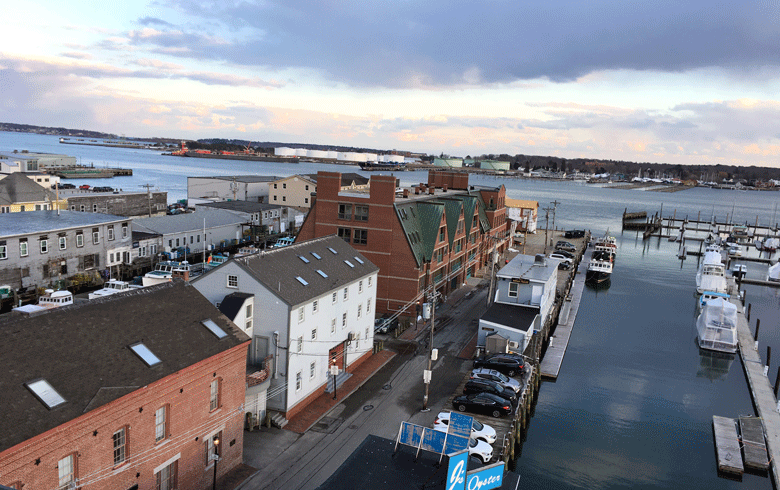In October 1957, national newspaper headlines announced that Jimmy Hoffa had been elected president of the International Brotherhood of Teamsters and the Soviet Union had successfully launched its satellite, Sputnik 1, into Earth’s orbit. Local headlines noted the less remarkable news that the city of Portland had updated its land use code. It would be more than 60 years before that code got a refresh.
That refresh, dubbed ReCode, got underway in the spring of 2020, said Christine Grimando, the city’s director of planning and urban development, during a webinar in June. The webinar, about how Portland is incorporating sustainability goals into the updated land code, was part of the Maine Conservation Voters’ Lunch and Learn series.
ReCode, Grimando told her virtual audience, is a two-phase initiative that seeks to refine and update the city’s land use code to dovetail with the goals and vision outlined in the city’s most recent comprehensive plan, adopted in 2017, and in One Climate Future, a joint climate action plan between Portland and South Portland approved by both cities in the fall of 2020.
The plan seeks to reduce greenhouse emissions community-wide by 80 percent by 2050…
The first phase of ReCode, completed in November 2020 when the city council voted to adopt the refreshed land use code, was a thorough restructuring of the city’s existing land code that made it more comprehensible and less rambling. The new land code has about 600 fewer pages than its predecessor, Grimando said. It is a “more sensible,” readable document, she added.
The second phase currently underway evaluates the revised land code to make sure it aligns with and advances the vision and goals of Portland’s comprehensive plan and that of One Climate Future.
The One Climate Future plan seeks to reduce greenhouse emissions community-wide by 80 percent by 2050, transition each city’s municipal operations to 100 percent clean energy by 2040, and invest in green spaces.
Portland’s comprehensive plan sets sustainability goals that include creating development policy that supports and encourages sustainable energy production and consumption; transportation policy that reduces vehicle miles traveled and enhances connectivity, including walkable neighborhoods and multiple modes of transportation offerings; and policy that makes housing more energy efficient and more resilient to climate change effects, such as rising sea levels and severe weather events and storm surges.
While ReCode’s second phase will do the heavy lifting of examining land use policies to see how, and if, they fit with the city’s sustainability goals and vision, phase one did offer some opportunities to address some important “low-hanging fruit” in terms of development policies, Grimando said, such as updated parking standards that encourage developers to look at alternatives to parking such as shuttle services or bike infrastructure, and putting in infrastructure requirements for projects of certain scales like, for example, requiring EV charging provisions for projects of a certain size.
Being a coastal city, the issue of water is front-and-center, Grimando noted, in both the land use code, but outside it, too. The city has already been looking at ways to improve or add new green infrastructure that will aid in improved water management, treatment, and quality, she said.
For example, the city is currently in the midst of a subsurface water infrastructure project in Back Cove that will stop overflows from going into Back Cove and Casco Bay.
“This is stuff you’ll never see when it’s all put back together,” she said, but will yield big environmental benefits.
Other, smaller tools the city is looking at to meet its sustainability goals around the issue of water include exploring ways sidewalk esplanades can better retain water and improving green roof standards where such infrastructure is allowed.
While Portland is doing a variety of things to address the “volatile” effects of climate change, she said, “we all know there’s a lot more to be talking about as far as keeping up with this danger.”
Learn more about Portland’s sustainability goals:
ReCode project: https://www.recodeportland.me
Comprehensive plan: https://www.portlandmaine.gov/1861/PortlandsPlan2030
One Climate Future: https://www.oneclimatefuture.org
Watch a video of Grimando’s Lunch and Learn presentation: https://www.maineconservation.org/lunchnlearn





